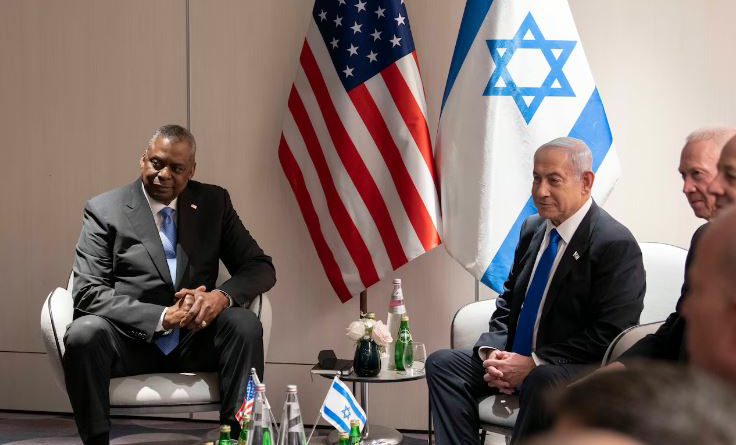U.S. and Israeli Leaders Discuss Relationships and Threats
The dangers posed by Iran, including Iranian support for terrorism, backing of proxy groups, aggression at sea, cyberthreats, proliferation of attack drones, and advanced conventional weaponry, were a major topic of conversation between Austin and Israeli leaders. Iran’s intention to develop a nuclear weapon is also a cause for worry; Austin argued that this must not occur.
The senior government and military figures spoke on, among many other things, the U.S.-Israel defence alliance, regional challenges presented by Iran, and America’s unwavering dedication to Israel’s security.
Austin clarified what might be the main purpose of his visit during a briefing after his meeting with the Israeli defence minister.
“I wanted to be here to make something very clear,” Austin said. “America’s commitment to Israel’s security is ironclad and it’s going to stay that way. As President Biden said on his visit to Israel last year, the connection between the Israeli people and the American people is bone deep.”
Austin also discussed his support for Israel’s right to self-defense and for U.S. security aid to Israel during his conversation with the prime minister. The $38 billion Memorandum of Understanding between Israel and the United States is a part of that agreement.
“Our historic Memorandum of Understanding with Israel provides $3.3 billion annually for security assistance, as well as additional funding for cooperation on missile defense,” Austin said. “I’m proud that President Biden reaffirmed his support for the Memorandum of Understanding and last year’s historic Jerusalem Declaration. And that declaration again reaffirmed the U.S. commitment to Israel’s security.”
The U.S. and Israel participated in the Juniper Oak military exercise in January as a result of that agreement. The bilateral live-fire exercise, which comprised some 6,400 American and 1,500 Israeli personnel, was the biggest and most significant one the two countries have ever engaged in jointly. It was conducted in both Israel and the Mediterranean Sea.
The United States and Israel assessed their command and control, air operations for maritime surface warfare, and combat search and rescue capabilities during Juniper Oak. Also, the two countries collaborated to improve interoperability in the following areas: electronic attack, enemy air defence suppression, strike coordination and reconnaissance, and air interdiction.
“Juniper Oak underscored the depth of our security partnership,” Austin said. “It was a key step forward in interoperability, helping us both to better address regional threats. And it showed our ability to swiftly flow in forces and respond to crisis, even while maintaining our commitments in other key theaters.”
The dangers posed by Iran, including Iranian support for terrorism, backing of proxy groups, aggression at sea, cyberthreats, proliferation of attack drones, and advanced conventional weaponry, were a major topic of conversation between Austin and Israeli leaders. Iran’s intention to develop a nuclear weapon is also a cause for worry; Austin argued that this must not occur.
“We continue to believe that diplomacy is the best way to prevent Iran from getting a nuclear weapon,” Austin said. “As President Biden has repeatedly made clear, the United States will not allow Iran to acquire a nuclear weapon.”
Austin also spoke with Israeli leaders on the current high level of hostility between Israelis and Palestinians.
Austin sent his sympathies to the Prime Minister on behalf of the most recent terrorist victims and restated his support for Israel’s right to self-defense against such attacks. Austin added, however, that there was “open and genuine talk” regarding defusing tensions, particularly prior to Passover and Ramadan.
“The United States also remains firmly opposed to any acts that could trigger more insecurity, including settlement expansion and inflammatory rhetoric,” Austin said. “And we’re especially disturbed by violence by settlers against Palestinians. So, we’ll continue to oppose actions that could push a two-state solution further out of reach. And we’ll work to build on the February 26th agreement in Jordan, including the commitment by the parties to de-escalate on the ground and to prevent further violence and to fully implement the terms of the Aqaba Communique.”
Austin had previously travelled to Jordan, Iraq, and Egypt before his trip to Israel. The secretary highlighted the United States’ commitment to the Middle East and to expanded security cooperation relationships in each of the four countries.


